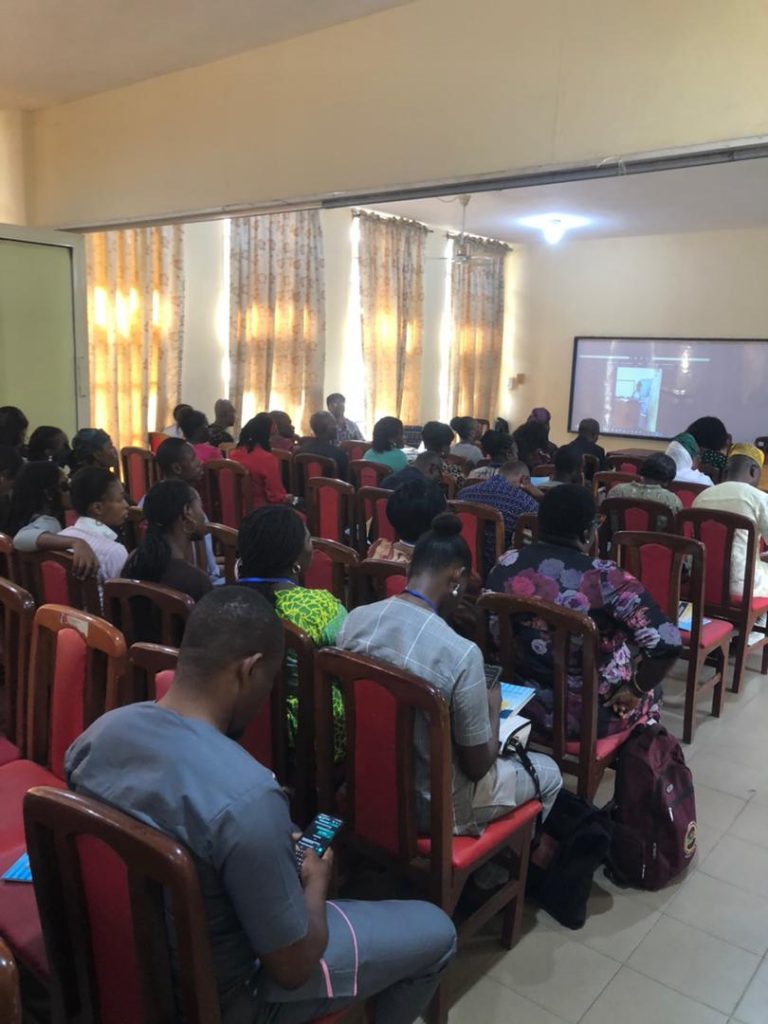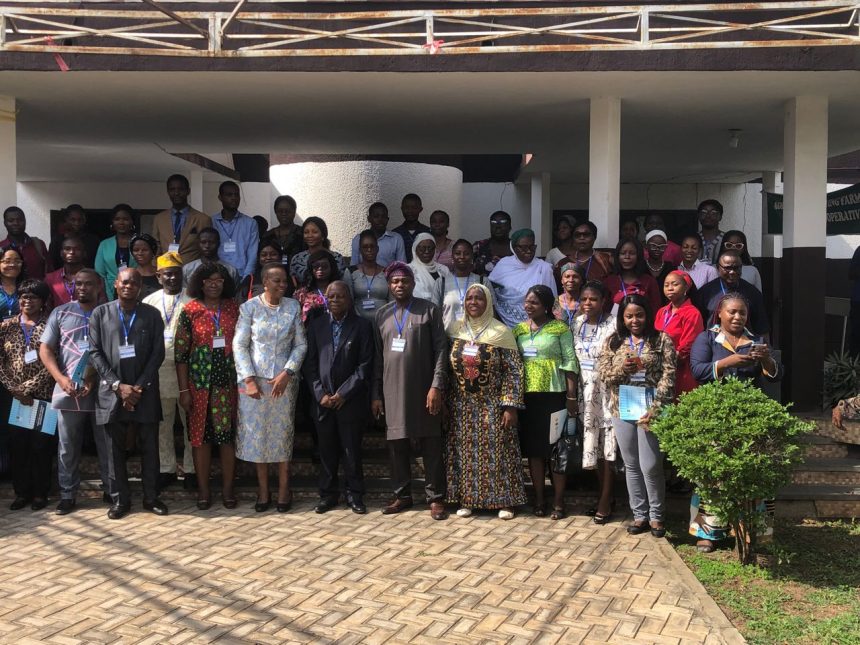Experts, academics, non governmental organizations as well as students under the aegis of Strengthening Capacity for Research and Policy Engagement on Notions of Motherhood and Fatherhood and Improved Children’s Wellbeing in Africa (SCaRPE-A), have advocated for safe motherhood and responsive fatherhood in child upbringing while calling for the eradication of child labour in our society.
This was made known yesterday at a One-Day Conference on Childhood Identities and Wellbeing in Nigeria which culminated into policy report titled: Parenting and Children Wellbeing In Nigeria: Dynamics, Interventions and Agenda Action presented by the duo of Dr. Mutiat Oladejo who is a Senior Lecturer at the Department of History, University of Ibadan and Dr. Sharon Omotoso who is a Senior Research Fellow (Gender/Media Studies) at the Institute of African Studies, University of Ibadan.

The event had scholars from various disciplines who also added their research inputs to the theme of the event.
In his opening remark, Professor S.O. Oyetade, Dean of the Faculty of Arts, University of Ibadan, thanked the Department of History for organising the Conference on parenting and children wellbeing in Nigeria, an important area of consideration in contemporary world owing to the changing notions in parenting and child upbringing. He noted further that the upbringing of a child is the collective responsibility of the society, but due to the high level of decadence in society nowadays, the upbringing of the child suffers a setback.
Dr. Mutiat Oladejo while speaking to newsmen on the Policy report, highlighted some of the challenges facing motherhood in our society which have placed burden of child parenting strictly on mother while neglecting important role of fatherhood as an integral component in child upbringing.
She was quoted as saying, “we have been in this project since 2020 and our advocacy is to improve children wellbeing and ensure proper child upbringing irrespective of whether you are a father or mother. Notion of motherhood is usually entangled in the problem of women discrimination, biases against women in the society as there is too much burden on being a mother while fatherhood is relegated to only financial support to mother, neglecting the aspect of social, psychological and moral support to the mother. She therefore called for responsive fatherhood and safe motherhood to improve parenting and children wellbeing in Nigeria.
The Head of Department of History, UI, Prof. Rasheed Olaniyi while joining the conversation called for the eradication of child labour in our society. He attributed some challenges facing children in our society to bad parenting and that adequate steps needed to be taken to address those challenges. He however enjoined the political elites to address socioeconomic problems confronting the nation as this will reduce economic burden on parents who engage their children in hawking and other forms of street trading when they are supposed to be in school.
The programme which lasted for several hours hosted academics from various institutions and a communique drafted at the end of the programme is reproduced below:

Communique issued at the end of a one-day conference on Childhood Identities in Nigeria: Being, Belonging and Becoming, a project of Strengthening Capacity for Research and Policy Engagement in Shifting Notions of Motherhood and Fatherhood for Improved Children Well-Being in Africa (SCaRPE-A) in collaboration with the Department of History, University of Ibadan, Nigeria and Women’s Research and Documentation Centre (WORDOC), University of Ibadan, Nigeria.
The conference on Childhood Identities and Wellbeing in Nigeria and a Public Presentation of Policy report titled: Parenting and Children Wellbeing in Nigeria was held on Thursday, March 28, 2024 at Otunba Subomi Balogun Conference Centre, University of Ibadan, Nigeria as part of the project of SCaRPE-A Nigeria convened by Dr. Mutiat T. Oladejo and Dr. Sharon A. Omotoso.
The one-day Conference had in attendance scholars across various disciplines, educationists, representatives of non-governmental organizations, researchers and students. At 9am prompt, the conference opened with the introductory remark by Professor R.O Olaniyi, Head of History Department, University of Ibadan.
Following his address was the welcome speech by Professor S.O. Oyetade, Dean of the Faculty of Arts, University of Ibadan, who thanked the Department of History for organising the Conference on parenting and children wellbeing in Nigeria, an important area of consideration in the world today owing to the changing notions in parenting and child upbringing. He noted further that the upbringing of a child is the collective responsibility of society, but due to the high level of decadence in society nowadays, the upbringing of the child suffers a setback. He also made reference to how modernity has affected the upbringing of a child and thereby making it worse, the product of this according to him is what he described as (Abi Iko) one who was born but not trained and (Ako Igba) one who received moral training but refuse to put the training into use. He highlighted that at the end of the conference there should be resolutions and suggestions for parents to take care of their children. In the opening remark by the Deputy Vice Chancellor, (Research Innovation and Strategic Partnerships), Prof. Oluyemisi Bamgbose commended the Department for the wonderful opportunity of such a program and the need for the department to continue on such a trend towards having a better society. At 9:55am, the session rose for a group photograph.
This was immediately followed by the first lead paper presentation by Prof. Rasheed Olaniyi, Head of Department of History University of Ibadan. In his presentation titled: “Reckoning with the cycles of Abuse: Perspectives on labour exploitation of children in Nigeria”, Prof. Olaniyi applied an holistic approach in tackling the issue of child Labour and its consequences. He recognised the major reasons many children are used as cheap labourers is because of their inability to negotiate with the employees. He went further to identify the patterns of Child Labour ranging from street hawking, child marriage, child begging and child prostitution. Child labour affects both the boys and girl child which are subjected to exploitative practices. Beyond losing their childhood, these children developed survivor personality. He rounded up by saying that child learning is holistic, education should be prioritized and child labour should be curbed. The second lead paper was presented by Prof. Olukemi K. Amodu of the Institute of Child Health, College of Medicine, University of Ibadan. She emphasized on Childhood Immunisation as an integral factor in the becoming of a child. In the context of Nigerian society, she reiterated how researches on immunization is crucial in policy uptake for a healthy society.
At the parallel sessions, about forty (40) papers were presented by participants. Generally, some of the recommendations and resolutions reached at the conference included collaborative efforts among stakeholders in government, non-governmental agencies, schools and academic institutions, members of the public and the family in tackling the vice of child trafficking, improving children’s welfare and as well as changing the notions of parenting for effectiveness. Other recommendations include the adoption of enforcement agencies in tackling child trafficking, beyond the mere rhetoric of it.
The conveners presented a policy report on parenting and children wellbeing in Nigeria, published conference proceedings and edited publication of fieldnotes by early career researchers. The outcomes of the capacity strengthening process are uploaded in the website of African Research University Alliance, Centre of Excellence in Notions of Identities, Makerere University, Uganda.
By 5:51 pm, Dr. Mutiat Oladejo gave the vote of thanks and note of appreciation to all participants at the conference and the conference ended with key issues manifesting that:
- identity should not be a fixed construct but it should be viewed as dynamic and changing.
- tradition tends to impose communal moral imposition on the child, motivating all moralists in the community to assault the child.
- deadbeat mothers and fathers are common in the society but the wounds are incurable in the minds of children.
- mothers’ undergo severe burdens involving poverty, spirituality, infertility and sacrifice in child upbringing.
- the reason for child labour are manifest in debt bondage, lack of education, weak institutional framework and budget constraints.
- impacts of entrepreneurship in child labour is exploitative because it leads to nonchalant attitude in concentrating on education and apprenticeship.
- childhood immunization is an important aspect as feeding a child because of the exposure of children to various diseases and conditions.
- the growing population in Nigeria has led to increased in the challenges of parenting on both fatherhood and motherhood.
- there is no one way parenting styles as there have been several dynamics which have shaped the phenomena of parenting depending on class status in the society.
- out-of-school children is a complicated issue, because of the cultural mindset on child labour
- baby factory phenomenon has become an illicit economy that connects other West African countries
- juvenile prostitution is an illicit economy that parents are also complicit in using their girls for.
- child trafficking is also an illicit economy expanding rapidly due to challenges of inadequate care.



